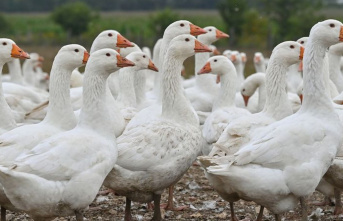Germany's dependence on raw material imports with strongly fluctuating and sometimes drastically increased prices tended to increase even before the start of the war in Ukraine. This emerges from data for the year 2021, which the Federal Institute for Geosciences and Natural Resources (BGR) in Hanover has now published. Experts from the specialist authority pointed out the vulnerability of the economy and advocated expanding the recycling of metal resources.
According to BGR information, the total amount of raw materials imported into Germany in 2021 grew by around 3 percent to almost 400 million tons compared to the previous year. At the same time, however, the associated costs skyrocketed by more than half to a good 211 billion euros and thus reached an all-time high.
The main drivers were the significantly higher commodity prices before Russia then attacked the Ukraine at the end of February this year. The demand for important resources had picked up again since the Corona crisis subsided. "Industrial metals, precious metals as well as cobalt and lithium, which are important for electromobility, have become significantly more expensive," explains the BGR in its current "Raw Materials Situation Report". The authority analyzes the situation on the global commodity markets on behalf of the Ministry of Economic Affairs.
Association: Tapping into domestic reserves again
"Germany remains heavily dependent on imports, especially for metal and energy raw materials," says Sören Henning, who headed the study. Energy and metal raw materials would have accounted for a good half of import expenditure in 2021. Meanwhile, domestic production of natural and mine gas fell slightly by 0.1 percent, and crude oil fell more significantly by 4.7 percent. The Federal Association for Natural Gas, Oil and Geoenergy called for more domestic reserves to be tapped in view of the delivery restrictions from Russia - the quantities still available can at best only contribute a small proportion of Germany's total requirement.
On the other hand, the self-production of lignite increased by 17.6 percent compared to 2020. Since the beginning of the war, despite the decision to phase out coal, several power plants have been brought back onto the grid or into reserve in order to prevent bottlenecks in the power supply. For mineral raw materials from Germany, the BGR evaluation shows a slight increase of 1.3 percent. The authorities recently warned that the mining of gravel and sand, which dominates in this country, could also run into shortages - with possible consequences for construction projects.
The BGR emphasized that greater efforts in the recycling of metal raw materials could also counteract the upward trend in prices and the delivery problems in international trade. The recycling of such materials should help to strengthen the security of supply. According to Vice President Volker Steinbach, this also improves the sustainability of use: "Copper, iron and steel, aluminum as well as zinc and lead in particular already make an important contribution to environmental protection and resource protection thanks to the sometimes significant recycling rates."







